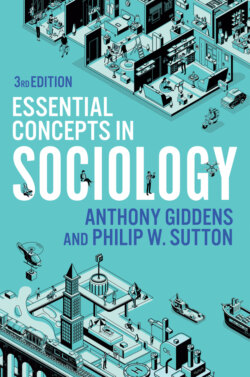Читать книгу Essential Concepts in Sociology - Anthony Giddens - Страница 86
Meaning and Interpretation
ОглавлениеStructure/agency is one of several related conceptual dichotomies in sociology, including macro/micro and society/individual. The structure/agency distinction is perhaps the most enduring division, and it led Alan Dawe (1971) to argue that there were in fact ‘two sociologies’, with contrasting subjects, research methods and standards of evidence. Even those who would not go quite that far see grappling with agency/structure as fundamental to the practice of doing sociology.
It may appear that those studying social structures would look at large-scale phenomena at the macro level, ignoring individual action, while those studying agency would focus only on individual actions at the micro level. This is not a bad rule of thumb, but there are structured interactions and relationships at the micro level that involve the study of individual actions, and, conversely, it is possible to argue that not only individuals but also collective entities such as trade unions, social movements and corporations can be said to ‘act’ and therefore to exercise creative agency in shaping social life. Thus, the structure/agency dichotomy does not map neatly onto the macro/micro distinction.
Social structures such as the class system, the family or the economy are built from social interactions, which endure and change over time. For instance, the class system has changed significantly as a result of generally rising income levels, competing forms of identity (such as gender and ethnicity) and the creation of new types of occupation and employment. However, there is still a class system into which people are born and which has a major effect on their life chances. Similarly, family life today is far more diverse than it was even fifty years ago, as societies have become multicultural, more married women enter the workplace and divorce rates have risen sharply, but all families continue to perform important functions such as socialization, which provides the necessary training for life in society. At a general level, then, social structures create order and organize the various spheres within society.
For some the concept of social structure can be hard to accept. At best, social structures are seen as heuristic concepts, constructive fictions created by sociologists to assist their studies, and, at worst, reifications, the illegitimate concretizing as ‘things’ of what are really fluid sets of social relationships. A key element of interactionism is the interpretation of situations which are influenced by others and involve a certain reflexivity. Hence, the kinds of fixed, organizing structures proposed by structural theorists are much more malleable, impermanent and open to change than is supposed. The relatively peaceful 1989 gentle or ‘velvet’ revolution in Czechoslovakia shows how quickly apparently solid social structures and institutions can crumble under the creative action of individual and collective agency.
The separation of the ‘two sociologies’ has been seen as a problem for the discipline, because studying structure without agency and agency without structure would seem to limit the sociological imagination to partial accounts of social reality. The solution would seem to be finding a productive way of combining agency/structure which keeps the best insights of both while moving beyond the dichotomy.
